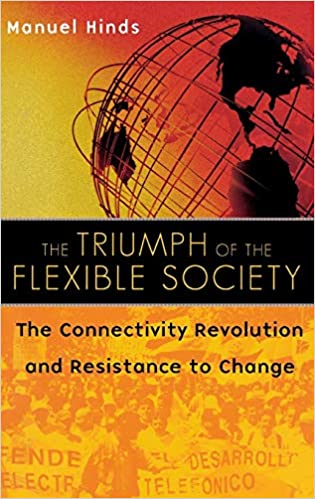The Triumph of the Flexible Society
 Buy the Book: Amazon, Barnes & Noble, Bookshop, IndieBound
Buy the Book: Amazon, Barnes & Noble, Bookshop, IndieBoundTitle: The Triumph of the Flexible Society: The Connectivity Revolution and Resistance to Change
Published by: Praeger
Release Date: 30 November 2003
Pages: 224
ISBN13: 978-0275981280
Overview
Hinds offers a fresh perspective on the social, political, and economic disturbances now affecting our world. This book looks at those disturbances not as separate problems, but rather as the coherent symptoms of a deep technological revolution that is changing the shape of society on the scale of the Industrial Revolution: the Connectivity Revolution, the basis of the New Economy. Analyzing the resistance to change that erupted violently in response to that last major economic upheaval, Hinds shows how Communism, Nazism, and fundamentalism owe their triumphs not to the prevalence of poverty or oppression but to the rigidity of societies threatened by profound social changes prompted by rapid technological progress. He argues that only a horizontal, flexible society can smoothly manage change in such a way that the pain of transformation—and therefore the risk of giving birth to new varieties of destructive regimes—is minimized.
Praise
“His is an original and highly intelligent voice worth paying attention to, and his first book remains one of the most significant and thought-provoking I've ever acquired, nearly 20 years later (out of a likely total of 600+ books).”
—Hilary Claggett, Senior Acquisitions Editor, Global Business, Georgetown University Press, who acquired The Triumph for Praeger in 2003
“Provides the reader with a remarkable analysis of the challenges that the new 'information-related' technologies present in today's world. Manuel Hinds, an eminent Latin American policymaker in his own right, describes the difficulties of our current global environment, enriched by a fascinating historical perspective. Mr. Hinds's strong belief in the values of democracy and of the market economy is inspiring. Yet, it presents a major challenge to policy and opinion makers alike: how to use the technological revolution to improve society at large, without incurring the tragic mistakes of the past.”
—Claudio Loser, then of The Inter-American Dialogue, now of the Centennial Group